BURNING ISSUE
After another fire rips through ‘tortured’ Masiphumelele, community members weigh in on struggles and solutions
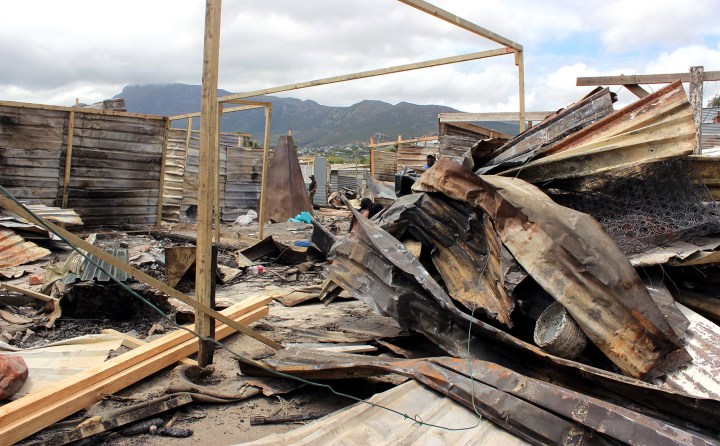
Fire safety workshops, proper housing and more power boxes. These are some of the suggestions residents of Masiphumelele in the Cape Peninsula have for reducing fire risks. This was after the second fire in a month tore through the area on Monday, 21 November.
For the second time in a month, Masiphumelele residents are struggling to pick up the pieces in the wake of a fire. On Wednesday — two days after the latest blaze — victims were attempting to rebuild with what little remained of their homes.
The fire, which broke out in Masiphumelele’s Z-section, affected 1,014 people: 295 men, 379 women, 289 children and 51 infants.
“It is very devastating, this fire, because people were traumatised with [the previous fire]. And now… comes another fire, so everyone is asking, what is going on? Why is Masiphumelele being tortured like this?” said Mkhululi Mfiki, a community leader in Z-section.
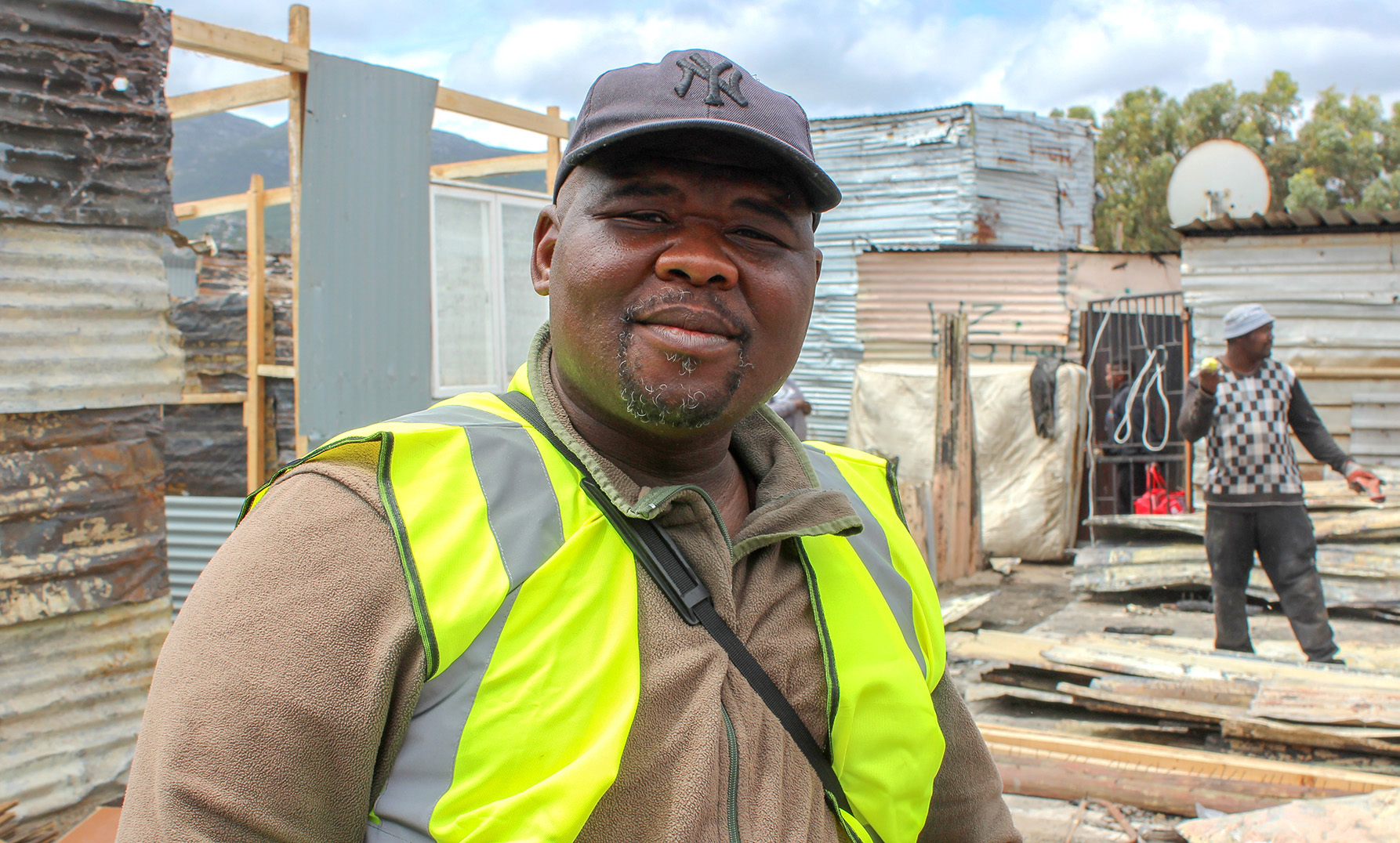
It has been ‘devastating’ for the people of Masiphumelele to have endured two fire disasters in the past month, according to Mkhululi Mfiki, a community leader in Masiphumelele’s Z-section. (Photo: Tamsin Metelerkamp)
Read more in Daily Maverick: “Fire rages in Masiphumelele – the second blaze in a month”
The previous fire broke out on 31 October and destroyed 309 structures and displaced 610 people.
Vatiswa Zwana, a resident of Z-section, told Maverick Citizen she was forced to flee her home without her possessions when the fire broke out. She is now staying at a friend’s residence.
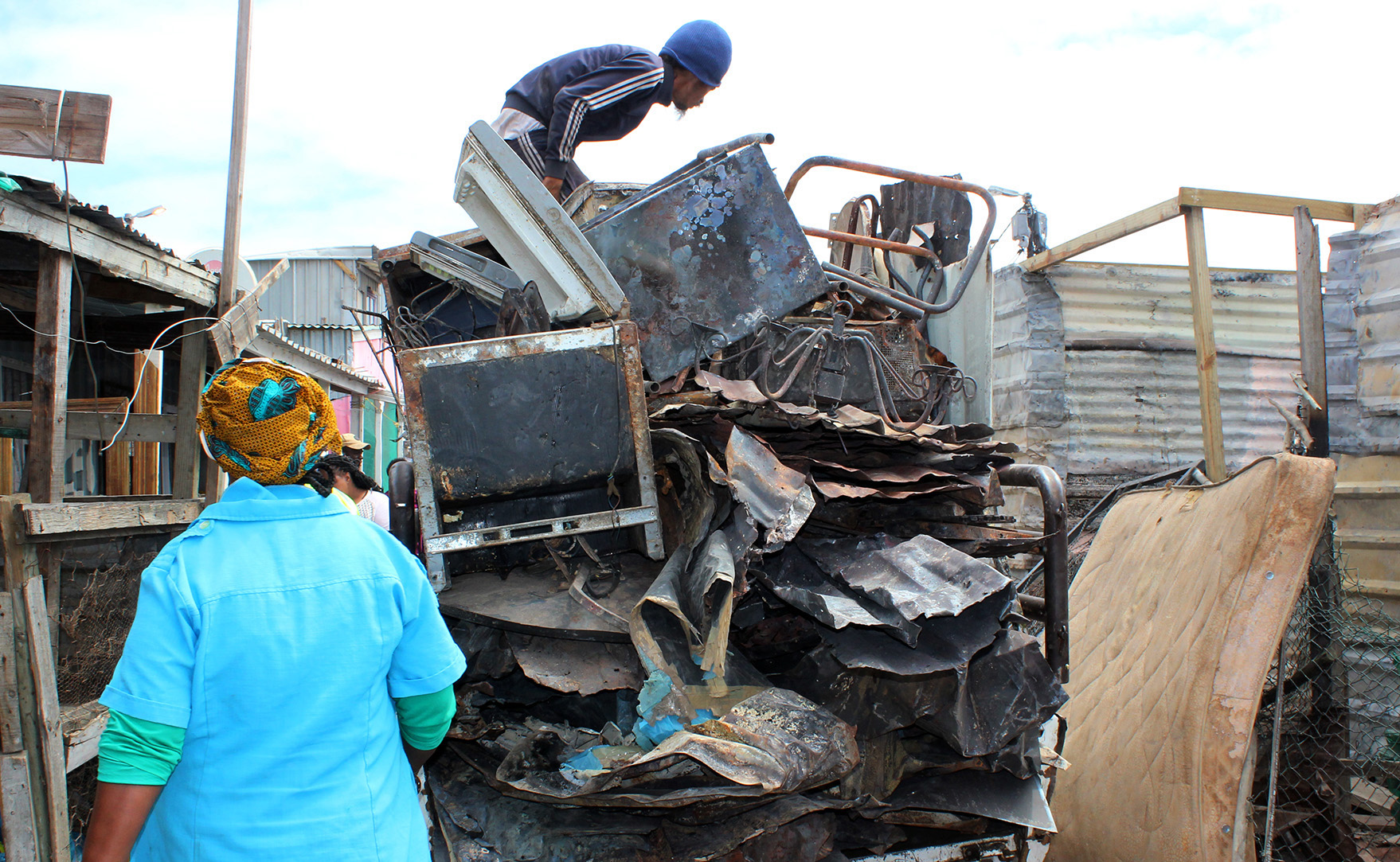
People remove burnt corrugated iron sheets from the area of Masiphumelele hit by the recent fire. (Photo: Tamsin Metelerkamp)
“You need [building] material to start with. We’ve got nothing. There’s no point in me asking for shoes and clothes — where am I going to live?” she said.
The nonprofit organisation Living Hope was at Masiphumelele on Wednesday, finalising the lists of fire victims alongside community leaders. The organisation is assisting with the distribution of food and aid through its network of soup kitchens in the area.
“With the kitchens, we try to set up a schedule of who feeds when and get everyone involved with the different stakeholders, because there’s other organisations like Gift of the Givers [assisting],” explained Linda Jaca-Njovane, Living Hope’s community liaison for Masiphumelele.
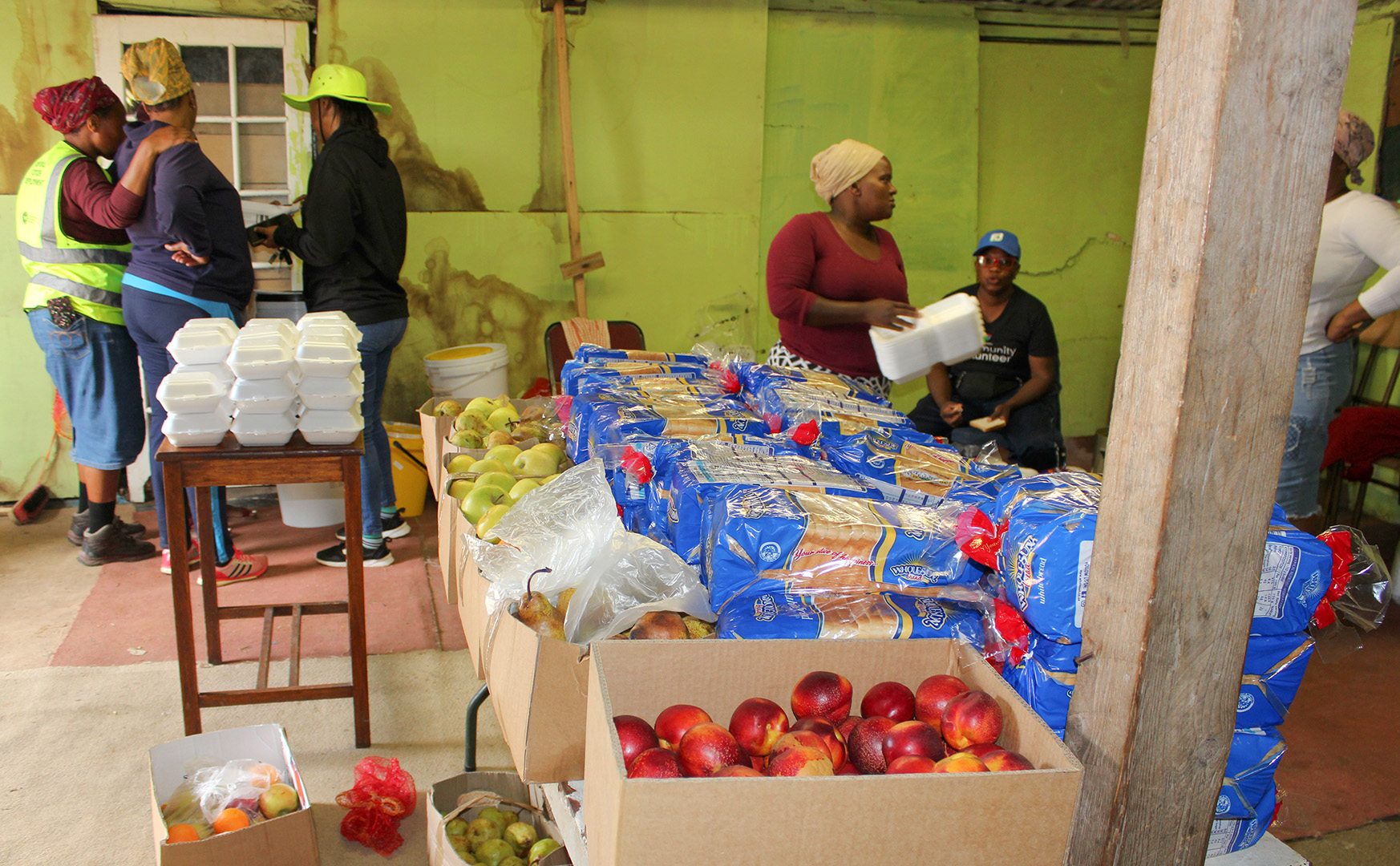
Food is distributed to fire victims in Masiphumelele on Wednesday, 23 November. (Photo: Tamsin Metelerkamp)
Gift of the Givers arrived in mid-afternoon with food for affected residents.
Residents of the community have provided support to fire victims by accommodating them in their homes and assisting with rebuilding.
“Everybody you see carrying a hammer and a spade here trying to help is [a member of the] community,” said Zwana as she stood among the burnt-out shacks.
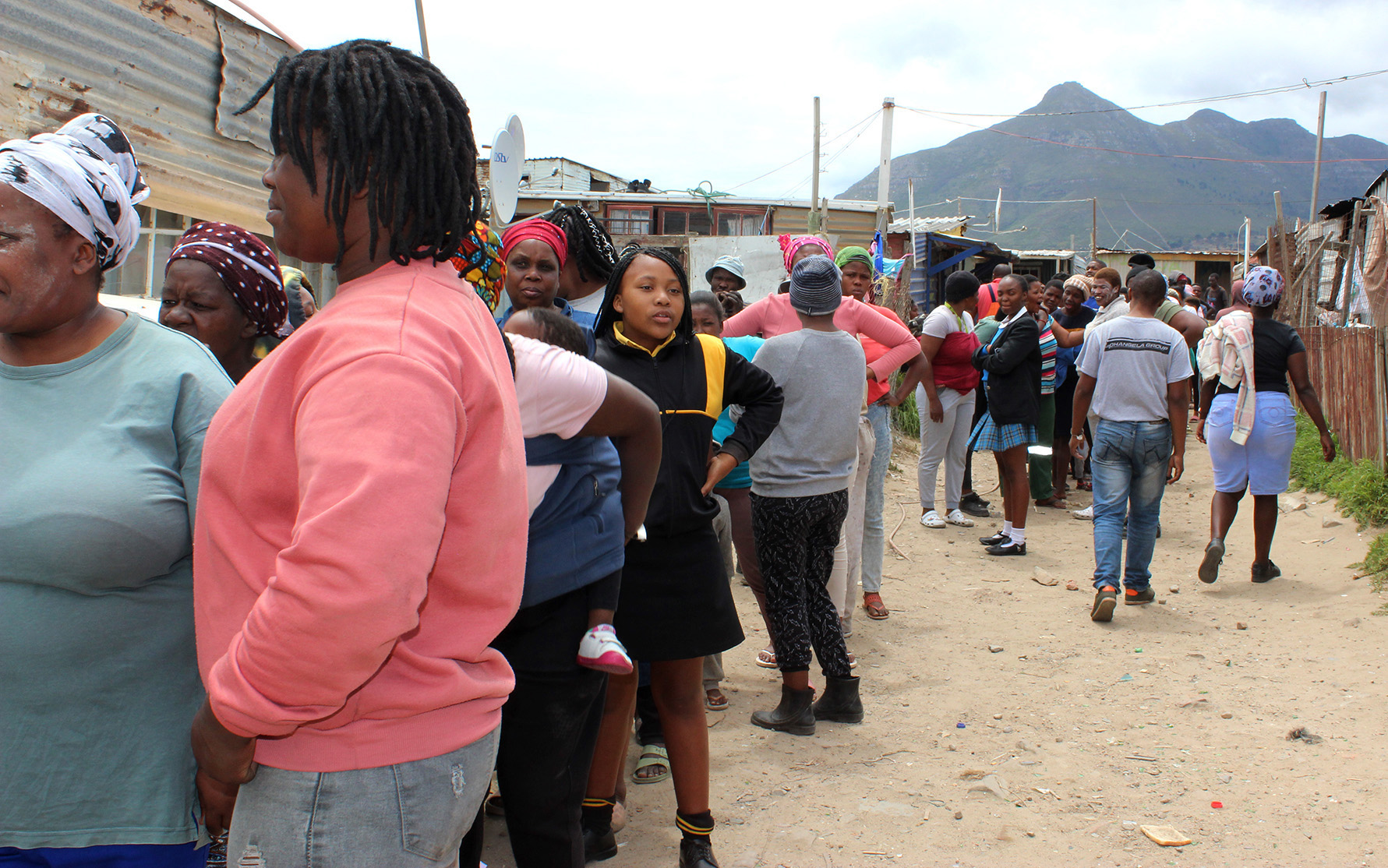
Masiphumelele fire victims queue for food on Wednesday, 23 November. (Photo: Tamsin Metelerkamp)
Recurring problems
While Masiphumelele has been plagued by fires over the years, many of the risk factors remain the same. Mfiki said there was a dire need for the City of Cape Town and its Disaster Risk Management team to educate people on fire safety.
“[It’s] not just giving pamphlets, because when you give pamphlets, you don’t know who’s going to read that pamphlet … or is going to throw it away. And not everyone can read, but they can listen to you,” he said.
He added that the city had provided some fire safety training for local leaders in the past, but this training was not broadly accessible to members of the community.
“Continuous fire awareness interventions are being conducted in informal settlements throughout the city, including Masiphumelele, with the latest [Expanded Public Works Programme] Fire and Life Safety door-to-door programme being conducted during July/August 2022,” said Greg Wagner, the spokesperson for the Cape Town mayor’s office.
“Community-based risk assessment workshops — which focus on hazard identification, mapping and identifying risk reduction methods — have been done with the Masiphumelele community.”
Wagner told Maverick Citizen that other interventions included a “Women and Girls Firewise Awareness programme” with participants from Masiphumelele and Ocean View, and an “Impact-Based Early Warning Workshop”, which was conducted in 2019 with the same communities.
Visit Daily Maverick’s home page for more news, analysis and investigations
“Another firewise awareness programme will be rolled out for this festive season as well, focusing on high-risk areas, which will also include the Masiphumelele informal settlement.”
A further fire risk Mfiki identified in Masiphumelele was a shortage of power boxes, resulting in people overloading the few power boxes that were there with illegal connections.
“I think half of this place doesn’t have electricity,” said Ntomboxolo Mbunjelwa, another resident of Z-section who lost her home. “Let’s say someone’s got electricity, then maybe five or seven people are using one box of electricity. So, that might cause fire because you see, all of us have got stoves, kettles and everything.”
Search for answers
Several residents advocated for the roll-out of proper housing as a way of reducing fire risks.
During a visit to the site on Tuesday, 22 November, Cape Town Mayor Geordin Hill-Lewis said Masiphumelele was a tough area for people to live in, as it was actually a wetland, according to the SABC.
“The permanent solution is to move people out of here and to dedensify this informal settlement completely, but of course as soon as we make space, more people move in almost instantaneously. So, it is a really, really tough conundrum to know what the permanent solution is,” he told the broadcaster.
Mfiki argued that even when affordable housing did become available, it usually only benefited a few Masiphumelele residents.
“There’s not much that they are doing to remove people here. They keep on saying this place is not suitable, but there’s nothing happening,” he said.
Wagner did not respond to Maverick Citizen’s question about whether the City of Cape Town had plans to relocate any residents of Masiphumelele. DM/MC




















 Become an Insider
Become an Insider
Comments - Please login in order to comment.